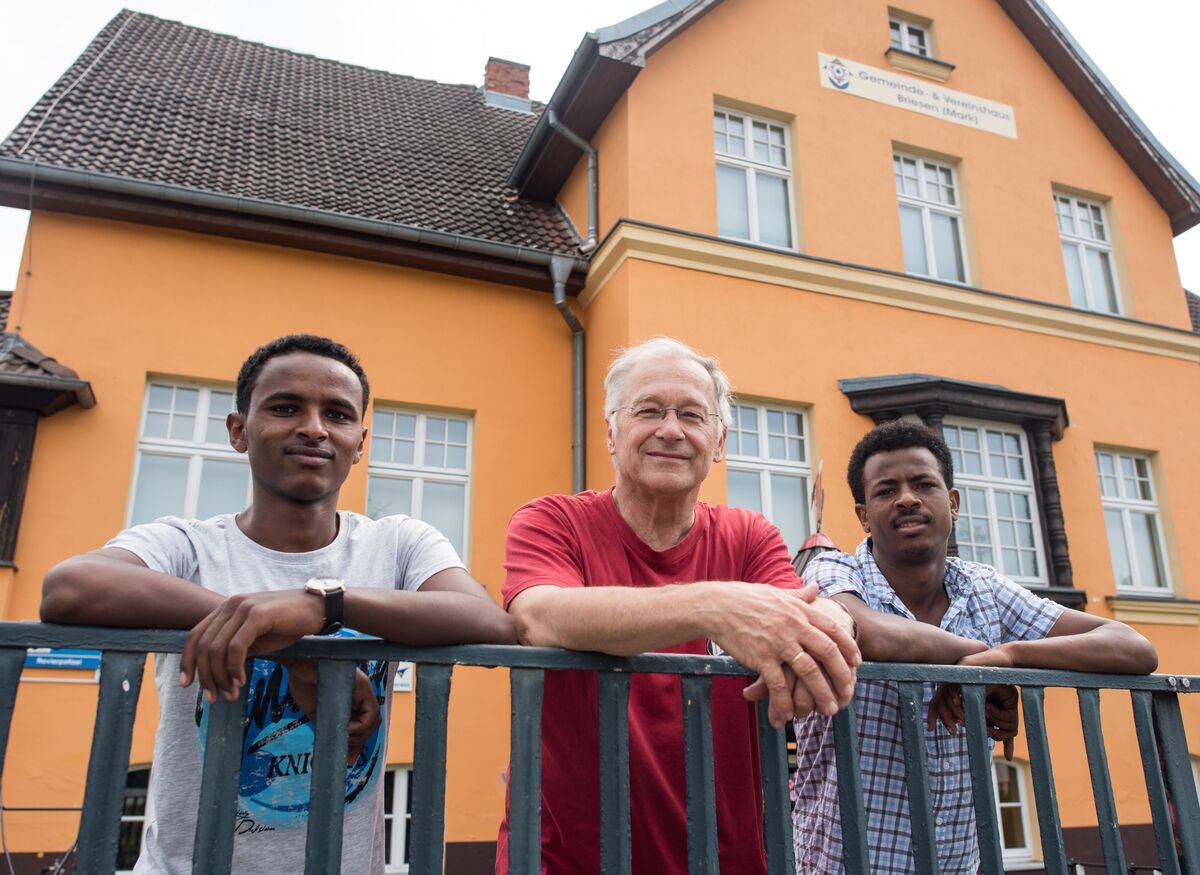
In 2015, as Europe struggled with the biggest influx of refugees since World War II, Martin Patzelt threw open the doors of his home outside Berlin to two young men from Eritrea.
Two years later, that humanitarian gesture might cost him his job.
Patzelt, 70, is a member of the lower house of parliament, the Bundestag, whose electoral district near the eastern border with Poland is being targeted by the populist, rightwing Alternative for Germany party in Sunday’s federal election.
Full Coverage: German Federal Election
As both a member of Chancellor Angela Merkel’s Christian Democratic Union and a high-profile face of the refugee crisis, Patzelt represents everything the AfD wants to overturn on Sept. The anti-Islam party has parachuted in Alexander Gauland, one of two lead national candidates, ensuring the contest is a straight run between pro- and anti-immigration voices, and so a microcosm of the main dividing line running through Germany at this election.
“I’m expecting a head-to-head race” in the district, Gauland, 76, said in an emailed response to questions. “Just as across Germany, support is very good for the AfD. I’m therefore not ruling out a surprise.”
Mood Has Changed
Patzelt knows he’s got a fight on his hands. A former social worker who went on to become mayor of his home city of Frankfurt-on-Oder, in eastern Germany, he won his district in the last election in 2013 with 33.9 percent of the vote, with the anti-capitalist Left party second and the Social Democrats a close third. What little local polling there is suggests the AfD is stronger than in Germany as a whole, with Gauland’s profile potentially drawing more votes.
“The mood here has changed,” Patzelt said in an interview in his parliamentary office in Berlin. “My district is in danger.”
Patzelt has experienced the shifting mood in person. Some hotel owners turned down his request to stay during his campaign tour, telling him that their reputation locally was at risk. Villages that used to be CDU strongholds have now gone to the AfD, Patzelt said. “Whole towns have collapsed,” he said.
That might open the door to Gauland, a former CDU member. The highlight of his political career to date was serving in the state government in Hessen at the time of the fall of the Berlin Wall and reunification. Then in 2013, he quit the CDU for the AfD in disgust at the series of financial bailouts for euro member states including Greece.
‘Dictator’ Merkel
He’s regularly made headlines since. He said he wouldn’t want a black member of the German national soccer team living next door; then during the campaign, he said that Merkel’s commissioner for migrant integration, a German of Turkish origin, should be “dumped in Anatolia,” a remark the chancellor denounced as “racist.” In his speeches, Gauland regularly calls Merkel a “dictator” who subordinated the German people with her refugee policy.
Germany’s Populist AfD Party Recognizes It Has an Image Problem
In a sign of the increasingly personal nature of the contest, the chancellor sent her interior minister, Thomas de Maiziere, to the district to support Patzelt’s campaign.
Patzelt made headlines himself when he took in refugees. A member of the Bundestag’s human-rights committee, he’d called a year earlier for individuals to help migrants. Der Spiegel magazine calls him the “anti-Gauland.”
“My colleagues tend to think that I’m just a friendly philanthropist, but it’s actually political motives which drive me,” Patzelt said. He wanted to demonstrate that Christian Democrats shouldn’t just talk about helping refugees, but do so in practical ways. One of the two refugees is still living in his home and sometimes accompanies him to political events, while the other has moved to Cologne to study. “They’ve become like family,” he said.
Rare Encounters
Patzelt says he first met Gauland at a reception in February, when Gauland tried to win him over to the AfD. Patzelt refused, arguing that while the AfD does have some valid points, it has a completely outdated world view. “I am not climbing into the grave with you,” he told Gauland. Since then, Patzelt said the two men have avoided each other. Gauland countered that his status as the AfD’s lead candidate limits the time he can spend in the district.
The AfD is gaining support all the same, tapping into a widespread feeling in the east that the political elite in Berlin is ignoring the subjects that matter most to voters, according to Claus Liesegang, editor-in-chief of the local newspaper, the “Maerkische Oderzeitung.” That means opposition to refugees, but also a fondness for Russia, concern at a high crime rate along the Polish border and pay that is 30 percent lower than in the west -- all topics addressed by the AfD. “This region feels completely abandoned,” Liesegang said.
For Patzelt, the AfD focus on his district makes him like a target. His campaign posters are regularly painted over with slogans like “Merkel’s puppet” and “Volksverraeter,” or “Traitor of the people” -- a term the Nazis used to denounce their political opponents.
“I regard this term almost as an honor,” Patzelt said. “People who were called this once died for their beliefs. So I feel I’m in good company.


0 comments:
Post a Comment